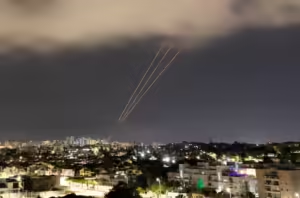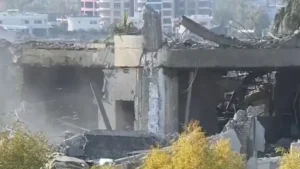After an Israeli airstrike on the Iranian consulate in Damascus resulted in casualties, Iran launched a retaliatory attack on Israel using drones and missiles. This marks a major escalation in tensions between the two longtime adversaries, bringing their long-running shadow war into open confrontation.
Israel has not officially confirmed its involvement in the attack on the consulate, but many analysts and international observers believe it was responsible. The strike shattered the delicate balance that had existed for years, where both nations targeted each other’s interests covertly while avoiding direct military engagement.
For decades, Iran and Israel have been engaged in a proxy conflict, with Tehran supporting groups like Hezbollah in Lebanon and various militia forces in Syria, while Israel has carried out targeted operations to weaken Iranian influence in the region. However, this latest exchange represents a significant shift, as Iran has directly launched an attack on Israeli territory, a move that could have far-reaching consequences.
The broader regional conflict has intensified since the outbreak of the Gaza war in October, when Hamas, a Palestinian militant group backed by Iran, launched a surprise assault on Israeli settlements near the border, resulting in thousands of casualties. Israel responded with a large-scale military campaign in Gaza, leading to a devastating humanitarian crisis and global calls for de-escalation. Iran has since repeatedly warned Israel against its actions in Gaza and has now acted on those threats by carrying out a direct attack.
Iran’s missile and drone barrage is a historic development, as it marks the first time Tehran has openly and directly targeted Israel rather than relying on proxy forces. This escalation raises concerns that other regional actors, including Hezbollah in Lebanon and various militia groups in Iraq and Syria, could become involved, leading to a broader and more unpredictable conflict.
Israel, backed by its allies, including the United States, has vowed to defend itself against any further aggression. Washington has expressed strong support for Israel while also urging restraint to prevent the situation from spiraling into an all-out war. The U.S. military has reportedly increased its presence in the region, preparing for the possibility of a wider confrontation involving Iran’s allied forces.
Iran, on the other hand, has framed its actions as a justified response to what it considers an Israeli violation of diplomatic norms. The attack on its consulate in Damascus is seen as a significant provocation, and Iranian leaders have warned that any further Israeli aggression will be met with even greater force.
This escalation has also put global powers in a difficult position. The United Nations and major world leaders have called for immediate de-escalation, fearing that a prolonged conflict could destabilize the Middle East further. Oil prices have already begun to react to the uncertainty, with markets fearing supply disruptions if the situation worsens.
As tensions continue to rise, the world is watching closely to see whether Israel will launch a retaliatory strike against Iran, which could push the region further toward a full-scale war. The coming days will be critical in determining whether diplomacy can defuse the situation or whether this marks the beginning of a much larger conflict with unpredictable consequences.


You must be logged in to post a comment.